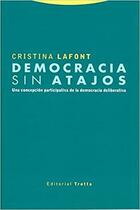
This book articulates a participatory conception of deliberative democracy that aspires to improve the democratic control of citizenship and defends the importance of citizen participation against conceptions that underestimate its value. To do this, it offers a critical analysis of pluralist, epistemic and lotocratic conceptions of democracy. Its defenders propose various institutional "shortcuts" to solve problems that plague democratic societies, such as the need to overcome deep disagreements, political ignorance of citizens or the low quality of public deliberation. Unfortunately, all of these undemocratic shortcuts require citizens to blindly defer to the decisions of actors over whom they cannot exercise any control (electoral majorities, political experts, or randomly chosen citizens). Implementing such proposals would therefore undermine democracy.
Furthermore, such con...read more









